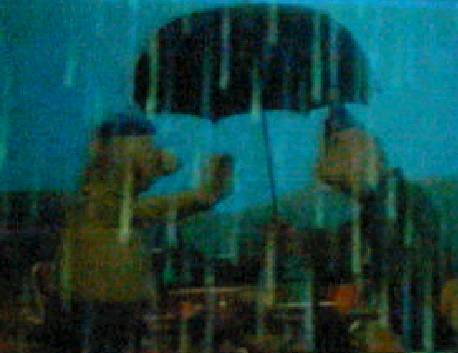 |
 Most anyone familiar with Czech culture has heard of The Good Soldier Svejk, that comic classic of world literature by Jaroslav Hasek, but I don't know anyone who's actually read it. I've tried, but the translation seemed stilted, not at all the "glazed writing, translucent, transparent..." as Bohumil Hrabal describes it in Total Fears. On the other hand, Pat and Mat, heroes of the ongoing animated short TV series A Je To (And That's It!) remain unknown to most of the world. (Or at least me, until now.) Since 1976, new 8 and 1/2 minute episodes have been created by various stop-motion animators for vecernicek (little evening story), a nightly TV bedtime show for children on the air uninterrupted since 1962. (A Je To is not the only series shown in this slot.) Mirek has a bunch of episodes on his computer so we projected a few on the wall of his home office tonight, improvising a projection stand in the best Pat and Mat fashion by placing a board between a bookshelf and the open drawer of a small podium. Each episode presents Pat and Mat with a problem to solve--whether it's how to wallpaper over a room after splattering its walls with canned gulas or moving a new washing machine up several flights of stairs--which they do by taking every shortcut possible with disastrous yet successful results. It's pure physical comedy with no words spoken. What I like best about it is the attention to detail, the respect for the laws of physics, and the resourceful application of everyday objects in inappropriate ways. It's funny! Czech animators are known around the world: Jiri Trnka, Jan Svankmajer, Aurel Klimt. But, guess what, Czech film is about to fall under the ax of global capitalism. Perhaps this should not come as a surprise. Business has no use for art except as commodified object. Artistic films do not serve the bottom line. Pat and Mat will probably survive, but funding for independent artists was recently vetoed by Czech president Vaclav Klaus (not to be confused with Vaclav Havel, who's out of politics but has endorsed Green Party candidates in the coming election) after having been ratified by Parliament. At issue was a 3% "tax" on commercial TV ad revenue which would go to keeping the tradition of Czech art cinema alive. The proposed law made sense: government grants the use of public airwaves to private companies (just like in the US), so why not ask for a little bit of the revenue back to serve the public interest? But like any doublethinking politician in the hip pocket of business, the president claims that the government shouldn't interfere in business--even if business is exploiting a resource that is public. Artists might be resourceful and will always find ways to bring their visions to light, but given Pat and Mat limitations, the results won't be the best. |
|
